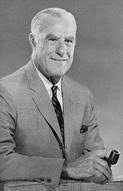Blumer, Herbert George

Bio: (1900-1987) American social psychologist and sociologist. Herbert Blumer taught sociology at the University of Chicago from 1928 to 1951 and at the University of Berkeley from 1951 to 1967. He followed the traditions of pragmatism and behaviorism. Blumer began as a student of George H. Mead and became one of his most important followers and successors. In 1937, Blumer coined the term symbolic interaction, which later gave the whole theoretical direction named "symbolic interactionism". Symbolic interaction refers to the fact that human interaction is always mediated by symbols.
Blumer adopts Mead's concept of "self," that is, man's ability to act in relation to himself. The ability to act in relation to oneself allows one to know the outside world. People face the outside world through the mechanism of self-indication, and that mechanism enables the interpretation of other people's actions. It follows that symbolic interaction is a psychological process through which individuals interpret the meaning of other people's actions. People try to "negotiate" different social situations that they encounter in everyday life and that produce new meanings and interpretations. These new meanings and interpretations enable man to react back to the surrounding phenomena, rejecting, accepting, or transforming existing patterns. Language is a mechanism for producing and symbolizing objects. Meaning is not inherent in the objects themselves but arises through symbolic interaction. The meaning is not fixed but is fluid and is constantly being rebuilt in relation to the world of objects. Group action is, in essence, the mutual alignment of individual directions of action.
Blumer creates a recursive theory of social structure and social action, a sociological theory that studies the dialectical relationships between social structures and human interpretive processes. Human behavior, mediated by symbolic interaction, creates social structures. The basic factors of human society are "units of action", and these can be individuals or collectives whose members work together to achieve a common goal. Blumer believes that social classes in modern society do not have empirically observable activities, and therefore do not form units of action. The experience of previous interaction and mutual understanding leads to the fact that all people define most situations in the same way. Culture, social structure, and social roles shape the situations in which human action takes place, and create sets of fixed symbols by which people interpret the situation, but people always act only in relation to the situation.
Blumer also analyzed collective behavior and mass society, studied fashion and saw it as a form of modernity, and conducted empirical studies of the film industry and its effects. He also developed a theory of racial relations. In his book Industrialization as an Agent of Social Change (1990), which was published posthumously, he studies the relationship between the process of industrialization and the social changes that industrialization has led to.
Fields of research
Culture Everyday Life Industry Language Media Personality Prejudice Psychology Race Role, Social Sign and Symbol Work FashionTheoretical approaches
Symbolic InteractionismMain works
Movies, Delinquency, and Crime (1933);
Movies and Conduct (1933);
The Human Side of Social Planning (1935);
"Sociological Theory in Industrial Relations," American Sociological Review (1947);
"Collective Behavior," in New Outline of the Principles of Sociology, by A. M. Lee (ed.) (1951);
"Reflections on Theory of Race Relations," in Man and Society: A Substantive Introduction to the Social Science, by Andrew W. Lind (ed.) (1955);
"Sociological Analysis and the "Variable",", in American Sociological Review (1956);
"Race Prejudice as a Sense of Group Position," The Pacific Sociological Review (1958);
"Recent Trends in Research on Race Relations: United States of America," International Social Science Journal (1958);
"Industrialization and Race Relations," in Industrialization and Race Relations, by Guy Hunter (ed.) (1965);
"Fashion: From Class Differentiation to Collective Selection." The Sociological Quarterly (1969);
Symbolic Interactionism: Perspective and Method (1969);
"Theories of Race and Social Action" (with Troy Duster), in Sociological Theories: Race and Colonialism (1980)
Industrialization as an Agent of Social Change (1990).

